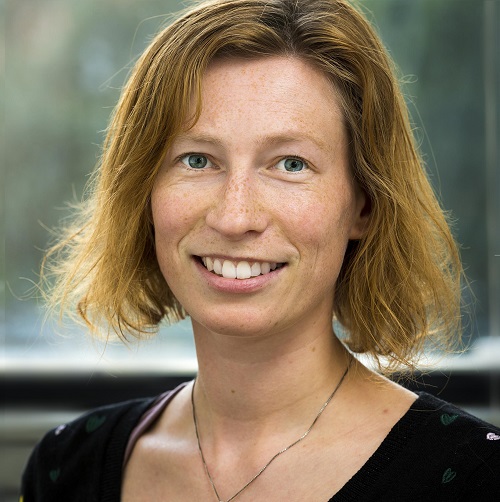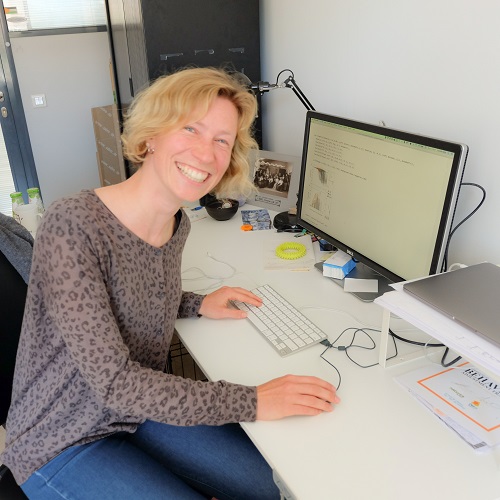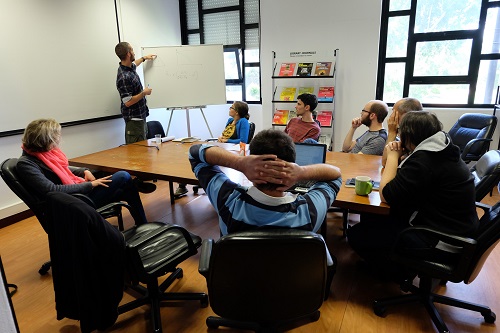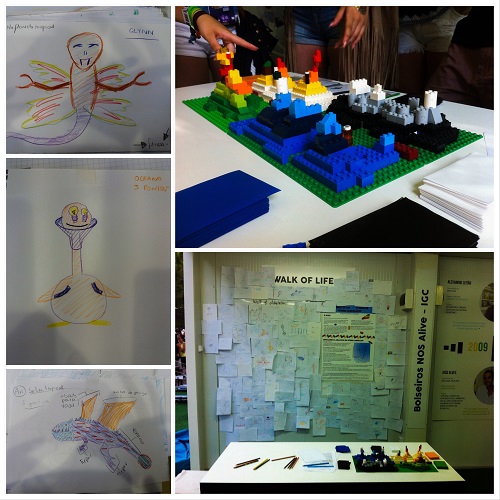 Dr. Claudia Bank
Dr. Claudia Bank
Principal Investigator
Evolutionary Dynamics Group
Instituto Gulbenkian de Ciencia
Oeiras, Portugal
https://evoldynamics.org/
Start date: January 2016
PhD: University of Veterinary Medicine in Vienna, Austria; advisors: Prof. Joachim Hermisson and Prof. Christian Schlötterer
Postdoc: Ecole Polytechnique Fédérale de Lausanne; advisor: Prof. Jeffrey Jensen
About the department:
The Gulbenkian Institute is a private research institution with ~36 research groups (with almost 50% female group leaders!) near Lisbon, in Portugal. I hold a 5-year group leader position there. The Gulbenkian Institute stands out by its interdisciplinary and open atmosphere, fostered by small groups, shared lab space, and no department structure (and a patio where everyone meets for lunch and coffee).
About the research program:
We study how populations adapt and diversify, with a specific interest in the role of epistasis during these processes. We use mathematical modeling to develop predictions, which we evaluate using experimental data, often obtained from the labs of a handful of great collaborators. Although we are mainly a dry lab, some lab members combine experimental and theoretical work. Here are some typical questions we address: How does the shape of a fitness landscape change along an environmental gradient? Can we predict the costs of antibiotic resistance across environments? What are the roles of local adaptation and epistasis during speciation?
What has been the biggest challenge as a new PI so far?
Being 2.5 years into having my own lab, currently my biggest challenge is to avoid stalling my lab members' progress. With a multitude of tasks pressing at any time, the more challenging ones, like editing my lab members' manuscripts or helping them to solve a mathematical or computational problem, often become postponed in favor of the "easier"/quicker ones (e.g., administrative), those for the pushiest collaborators, or those with hard deadlines (e.g., grant writing). I think that I am slowly getting better at this by (1) becoming more practised at writing/editing during small time windows, by (2) embracing imperfection, both with respect to enforcing my favorite writing style and to staying on time with everything, and by (3) learning to say "no" more often.
How do you approach mentoring your lab members?
Having lab members is one of my greatest joys but also challenges (see also above) as a PI. It is wonderful to have people contribute their own ideas and expertise while working on my favorite subjects and questions, and it makes me particularly happy to see when they make progress independently and with the help of each other. However, I feel great responsibility to mentor my lab members according to their individual needs, and to be available for questions and problems. Inspired by one of my colleagues, I have recently introduced a yearly feedback meeting with each lab member, to which both of us bring a filled-in questionnaire about progress, future (career and research) plans, relationship with me and the rest of the lab, motivating factors, suggestions for improvement, etc. The first round of meetings has been very valuable for both sides and I am looking forward to going into round two at the end of this year. I also meet with each lab member individually on a semi-regular basis depending on their status (for example, two of my co-supervised PhD students do experimental work and there is no need for us to meet when they are in the middle of experiments), their preference, and my travel schedule.
When was your first Evolution Meeting, and how did it affect your career?
In fact this year's meeting in Montpellier will be my first Evolution meeting! I am very excited for the great list of symposia, and for meeting my friends and colleagues. In addition, there is already a long list of people I am planning to talk to in person for the first time. These opportunities are what I love about big summer conferences, whereas small meetings and workshops are better to meet new people "by chance" and to build your network in the first place.
Do you remember your first publication in Evolution or Evolution Letters (acceptance or rejection)?
Yes! The very first paper of my scientific career was published in Evolution (Bank, C., Hermisson, J., & Kirkpatrick, M. (2012). Can reinforcement complete speciation? Evolution, 66(1), 229–239.), therefore the experience was particularly memorable for me.
Are you involved in evolution outreach? Tell us about it.
My institute is involved in various outreach activities, including a stand at a large music festival. My lab created an adaptation-themed board game that we first presented there and since at other instances. It consists of a (Lego) fitness landscape with different environments (colors) and fitness peaks, on which the players compete for reaching as high as possible. Before starting, players choose to walk across the landscape by either large-step, or small-step mutations, on top of which randomness is introduced by throwing a dice. Any time a higher level is reached, the player obtains a phenotype beneficial in the current environment (e.g., echolocation in the sea). At the end of the game, each player has to draw their own critter with the obtained phenotypes. It was a fun experience to develop the game together, and to see how people enjoyed playing it and how they started discussing the best adaptation strategies. Moreover, we got the most wonderful collection of drawings (see photos).
 Dr. Claudia Bank
Dr. Claudia Bank

